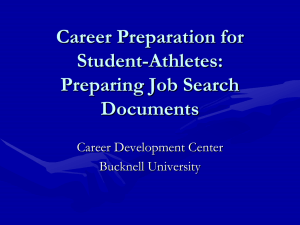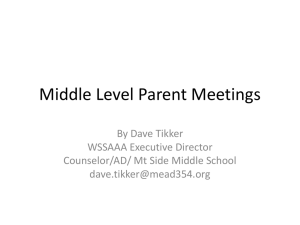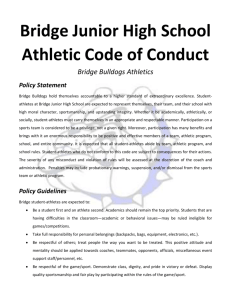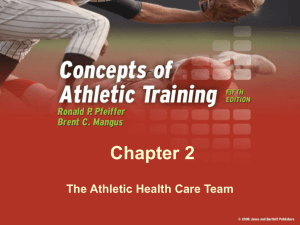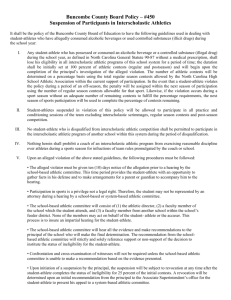student/athlete and parent handbook
advertisement
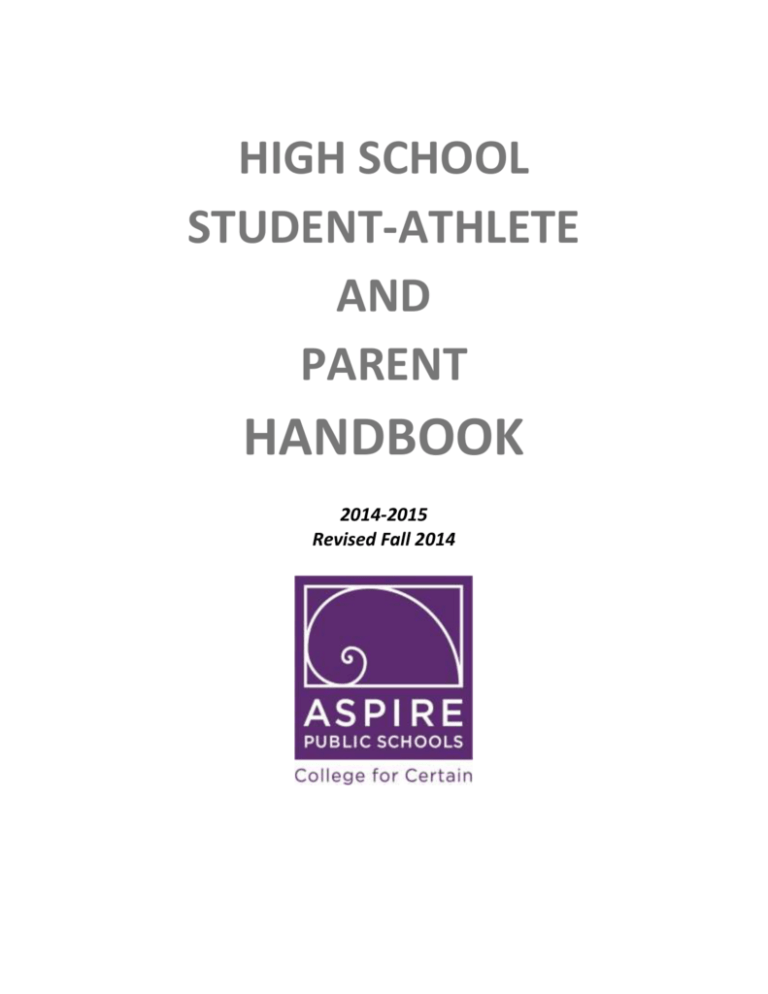
HIGH SCHOOL STUDENT-ATHLETE AND PARENT HANDBOOK 2014-2015 Revised Fall 2014 STUDENT-ATHLETE AND PARENT HANDBOOK The following guidelines were adopted from the Ivy League. These guidelines reflect interscholastic athletics. Aspire Public Schools, has been referred to as the “Ivy League” of Charter Management Organizations. I believe that by following the guidelines below Ben Holt will be able to provide our students with an opportunity to participate in interscholastic athletics but to keep academics at the fore front for each student athlete. Athletic Mission Statement In the spirit of an organization that provides its students with educational opportunities both broad and deep, Ben Holt College Prep Academy is committed to sustaining one of the most well respected interscholastic sports programs for boys and girls in the CIF. The athletic program plays an essential role in teaching students to conduct themselves with honesty and integrity, make sacrifices, strive for excellence, persevere through adversity, and compete with dignity and pride while developing a commitment to teamwork and service to the community. Ben Holt believes strongly that its athletic program should represent the same level of excellence and diversity found throughout the school, thereby providing the opportunity and encouragement for each student-athlete to reach his/her fullest intellectual and athletic potential. The common goal among Ben Holt’s athletic administrators, coaching staff, and scholar athletes is to achieve success at the highest level possible while abiding by the standards of good sportsmanship and ethical conduct. Moreover, the athletic program values equitable opportunities for women and minorities. In sum, Ben Holt expects to produce scholar-athletes whose performance in the classroom and on the fields of play are a reflection of the values of Aspire Public Schools. Core Values A. Integrity We are committed to the highest sense of integrity encompassing every aspect of our behavior as members of the Ben Holt Community. We strive for high moral character, honor, respect, and honesty in all our actions realizing that the strength of a community is based on the integrity of its members. B. Strength in Community We are a community encompassing our teams, the athletic department, the school, alumni, friends of Ben Holt, and the surrounding Stockton area. We serve as role models, mentors, and leaders seeking not only to teach others but 1 also to learn from their diverse experiences. We take pride in creating and fostering life enhancing reciprocal relationships, which lead to a strong and vibrant community. C. Individual Responsibility for a Common Goal For every group endeavor, each individual bears responsibility and plays an important role in reaching the common goal. D. Education of Mind, Body, and Spirit We are all students and our department thrives as a learning environment. We are committed to the education of the mind, body, and spirit and view these pursuits as inseparable. We believe in the integrity of each individual. E. Competitive Spirit We use the competitive spirit and sportsmanship we develop as teammates to do our best to become the very best. Our goal is to win and to excel at the highest level while acting and competing in a way that reflects our core values. F. Pride in Ben Holt and Aspire We are beneficiaries of rich and living tradition forged by the efforts of all those who have come before us. Our personal and team triumphs add to the growing pride that we share with the Ben Holt community. Through 2 leadership, school spirit, and devoted alumni, we build on the Ben Holt tradition and instill a pride in Ben Holt Athletics that remains throughout a lifetime. Athletic Objectives • To have Ben Holt represented by scholar-athletes whose conduct reflects credit upon the institution both in the classroom and on the field of play • To field competitive scholar-athletes and teams coached and supported by highly qualified individuals who are dedicated to the spirit and intent of all Ben Holt Academy, Aspire, and CIF rules Student-Athlete Responsibilities Each student-athlete is personally responsible for completing all academic requirements established for his/her diploma as set by Aspire Public Schools; abiding by all Aspire, CIF, and League rules; learning, understanding, and abiding by all applicable rules of the school and CIF, as may be appropriate. Academic Responsibilities • Attend classes regularly and complete all academic requirements • Consult with academic counselors and/or tutors as needed • Satisfy academic requirements and make satisfactory progress toward graduation • Maintain academic eligibility • Abide by all Ben Holt, team, Aspire and CIF rules • Attend all organized practices, unless officially excused • Take proper care of equipment and return it in good condition • Treat officials and opponents with respect • Abide by the standards of good sportsmanship and ethical conduct Academic Support Academics should always be the student-athlete’s first priority. The staff of Ben Holt is available to help the studentathlete achieve. Absence due to Athletics Student-athletes are expected to attend all classes. It is the responsibility of the student to notify his or her instructors of any absence due to interscholastic competition. This notification should be done well in advance of the competition. Athletic Eligibility CIF bylaws require all student athletes to have a 2.0 GPA as of the last grading period in all courses for which they are enrolled (including college classes taken through Ben Holt). The diagram below shows you what initial and continuing eligibility is for each season of sport. 3 Fall Sports Winter Sports Spring Sports Initial Eligibility Semester 2 (Prior Year) Quarter 1 (Current Year) Semester 1 (Current Year) Continuing Eligibility Quarter 1 (Current Year) Semester 1 (Current Year) Quarter 3 (Current Year) Academic Probation Students who do not maintain a minimum 2.0 GPA in all courses enrolled (including college courses), have “Ds” or “Fs” on their report card, or have outstanding Exhibition Projects, will be placed on Academic Probation after Quarter 1. Students who are placed on Academic Probation can remove themselves by demonstrating Adequate Academic Progress on the parent-signed Progress Monitoring Checks, which are done every 3 weeks in Advisory. Students on Academic Probation will not be allowed to participate in any club, team, or other activity that is not directly tied (through class curriculum) to a course they are enrolled in. 4 Aspire Participation Limitations Aspire Public Schools have limited the hours student-athletes may be required to practice, attend mandatory team events; and the limits vary by the time of year, or season. During Season (1st day of Practice- Last Contest Date) During the season, the student-athletes are limited to 8 hours per week with a maximum of 2 hours per day. Studentathletes must be granted one day off per week as well. A competition counts as two hours whether it lasts all day or just a few minutes. Out of Season Out of season student-athletes, not participating on another sporting team, are limited to six hours of voluntary conditioning activities per week, not to exceed 1.5 hours per day. Below are partial lists of common activities that count and do not count against daily and weekly time limits: COUNTABLE ATHLETICALLY RELATED ACTIVITIES • Practices (not more than two hours per day). • Athletics meetings with a coach initiated or required by a coach (e.g., end of season individual meetings). • Competition (and associated activities, regardless of their length, count as two hours) [Note: No countable athletically related activities may occur after the competition.] • Discussion or review of game films. • Field, floor or on-court activity. • Setting up offensive and defensive alignment. • On-court or on-field activities called by any member of the team and confined primarily to members of that team. • Required weight-training and conditioning activities. • Required participation in camps/clinics. NONCOUNTABLE ATHLETICALLY RELATED ACTIVITIES • Meetings with a coach initiated by the student-athlete (as long as no countable activities occur). • Study hall, tutoring or academic meetings. • Voluntary weight training not conducted by a coach or staff member. • Voluntary sport-related activities (e.g., initiated by student-athlete, no attendance taken, no coach present). • Attending banquets (e.g. awards or postseason banquets). • Fundraising activities or public relations/promotional activities and community service projects. 5 ATHLETIC GUIDELINES SPORTSMANSHIP Participation in the athletic program requires adherence to the highest standards of good sportsmanship. Aspects of good sportsmanship include ensuring fairness in competition and exhibiting respect for the people and institutions associated with athletic contests. In order to promote fairness in competition, the following 16 Principles of “Pursuing Victory with Honor” have been adopted by BHCPA. Athletes of this school will be required to comply with the rules of each sport and to ensure that fairness in competition is not limited by their actions in any way. 1. The essential elements of character building and ethics in California Interscholastic Federation (CIF) sports are embodied in the concept of sportsmanship and six core principles: trustworthiness, respect, responsibility, fairness, caring and good citizenship. The highest potential of sports is achieved when competition reflects these “six pillars of character.” 2. It’s the duty of School Boards, superintendents, school administrators, parents and school sports leadership – including coaches, athletic administrators, program directors and game officials – to promote sportsmanship and foster good character by teaching, enforcing, advocating and modeling these “six pillars of character.” 3. To promote sportsmanship and foster the development of good character, school sports programs must be conducted in a manner that enhances the academic, emotional, social, physical and ethical development of student-athletes and teaches them positive life skills that will help them become personally successful and socially responsible. 4. Participation in school sports programs is a privilege, not a right. To earn that privilege, studentathletes must abide by the rules and they must conduct themselves, on and off the field, as positive role models who exemplify good character. 5. School Boards, superintendents, school administrators, parents and school sports leadership shall establish standards for participation by adopting and enforcing codes of conducts for coaches, athletes, parents and spectators. 6. All participants in high school sports must consistently demonstrate and demand scrupulous integrity and observe and enforce the spirit as well as the letter of the rules. The importance of character, ethics and sportsmanship should be emphasized in all communications directed to students-athletes and their parents. 7. School Boards, superintendents, school administrators, parents and school sports leadership must ensure that the first priority of their student-athletes is a serious commitment to getting an education and developing the academic skills and character to succeed. 8. School Boards, superintendents, principals, school administrators and everyone involved at any level of governance in the CIF must maintain ultimate responsibility for the quality and integrity of CIF programs. Such individuals must assure that education and character development responsibilities are not compromised to achieve sports performance goals and that the academic, social, emotional, physical and ethical well-being of student-athletes is always placed above desires and pressures to win. 9. All employees of member schools must be directly involved and committed to the academic success of student-athletes and the character-building goals of the school. 10. Everyone involved in competition including parents, spectators, associated student body leaders, and all auxiliary groups have a duty to honor the traditions of the sport and to treat other 6 participants with respect. Coaches have a special responsibility to model respectful behavior and the duty to demand that their student-athletes refrain from disrespectful conduct including verbal abuse of opponents and officials, profane or belligerent trash-talking, taunting and inappropriate celebrations. 11. School Boards, superintendents, and school administrators of CIF member schools must ensure that coaches, whether paid or voluntary, are competent to coach. Training or experience may determine minimal competence. These competencies include basic knowledge of 1) the character building aspects of sports, including techniques and methods of teaching and reinforcing the core values comprising sportsmanship and good character; 2) the physical capabilities and limitations of the age group coached, as well as first aid, and; 3) coaching principles and the rules and strategies of the sport. 12. Because of the powerful potential of sports as a vehicle for positive personal growth, a broad spectrum of school sports experiences should be made available to all of our diverse communities. 13. To safeguard the health of athletes and the integrity of the sport, school sports programs must actively prohibit the use of alcohol, tobacco, drugs and performance enhancing substances, as well as demand compliance with all laws and regulations, including those related to gambling and the use of drugs. 14. Schools that offer athletic programs must safeguard the integrity of their programs. Commercial relationships should be continually monitored to ensure against inappropriate exploitation of the school’s name or reputation. There should be no undue influence of commercial interest. In addition, sports programs must be prudent, avoiding undue dependence on particular companies or sponsors. 15. The profession of coaching is a profession of the mental and physical dimensions of their sport. Coaches, through words and example, must also strive to build the character of their athletes by teaching them to be trustworthy, respectful, responsible, fair, caring and good citizens. Any person who is unable to comply with these standards must understand that his/her opportunity for participation may be limited or removed. CODE OF CONDUCT FOR PARENTS/GUARDIANS The role of the parent in the education of a student is vital. The support shown in the home is often manifested in the ability of the student to accept the opportunities presented at school and in life. There is a value system–established in the home, nurtured in the school – that young people are developing. Their involvement in classroom and other activities contributes to that development. Trustworthiness, citizenship, caring, fairness and respect are lifetime values taught through athletics. These are the principles of good sportsmanship and character. With them, the spirit of competition thrives, fueled by honest rivalry, courteous relations and graceful acceptance of the results. As a parent/guardian of a student-athlete at our school, your goals should include: Promote a healthy lifestyle that does not include the use of performance enhancing drugs or supplements; Realize that athletics are part of the educational experience, and the benefits of involvement go beyond the final score of a game; 7 Encourage our students to perform their best, just as we would urge them on with their class work; Participate in positive cheers that encourage our student-athletes; discourage any cheers that would redirect that focus – including those that taunt and intimidate opponents, their fans and officials; Learn, understand, and respect the rules of the game, the officials who administer them and their decisions; Respect the task that our coaches face as teachers; and support them as they strive to educate our youth; Respect our opponents as student-athletes, and acknowledge them for striving to do their best; and Develop a sense of dignity and civility under all circumstances. You can have a major influence on your student’s attitude about academics and athletics. The leadership role you take will help influence your child, and our community, for years to come. Violation of the above code of conduct could result in one or more of the following consequences: a warning, removal from the venue, suspension, or further discipline to be determined by the administration (per P.C. 602.1, 653g, and P.C. 6476). CODE OF CONDUCT FOR INTERSCHOLASTIC STUDENT-ATHLETES Interscholastic athletic competition should demonstrate high standards of ethics and sportsmanship and promote the development of good character and other important life skills. The highest potential of sports is achieved when participants are committed to pursuing victory with honor according to six core principles: trustworthiness, respect, responsibility, fairness, caring, and good citizenship. This Code applies to all student-athletes involved in interscholastic sports in California. I understand that, in order to participate in high school athletics, I must act in accord with the following: defeat with dignity; give fallen opponents help, compliment extraordinary performance, show sincere respect in preand post-game rituals. 4. Disrespectful Conduct – don’t engage in disrespectful conduct of any sort including profanity, obscene gestures, offensive remarks of a sexual or racial nature, trashtalking, taunting, boastful celebrations, or other actions that demean individuals or the sport. 5. Respect Officials – treat contest officials with respect; don’t complain about or argue with official calls or decisions during or after an athletic event. TRUSTWORTHINESS 1. Trustworthiness – be worthy of trust in all I do. Integrity – live up to high ideals of ethics and sportsmanship and always pursue victory with honor; do what’s right even when it’s unpopular or personally costly. Honesty – live and compete honorably; don’t lie, cheat, steal or engage in any other dishonest or unsportsmanlike conduct. Reliability – fulfill commitments; do what I say I will do; be on time to practices and games. Loyalty – be loyal to my school and team; put the team above personal glory. RESPONSIBILITY 6. Importance of Education – be a student first and commit to getting the best education I can. Be honest with myself about the likelihood of getting an athletic scholarship or playing on a professional level and remember that many universities will not recruit student-athletes that do not have a serious RESPECT 2. Respect – treat all people with respect all the time and require the same of other studentathletes. 3. Class – live and play with class; be a good sport; be gracious in victory and accept 8 commitment to their education, the ability to succeed academically or the character to represent their institution honorably. 7. Role-Modeling – Remember, participation in sports is a privilege, not a right and that I am expected to represent my school, coach and teammates with honor, on and off the field. Consistently exhibit good character and conduct yourself as a positive role model. 8. Self-Control – exercise self-control; don’t fight or show excessive displays of anger or frustration; have the strength to overcome the temptation to retaliate. 9. Healthy Lifestyle – safeguard your health; don’t use any illegal or unhealthy substances including alcohol, tobacco and drugs or engage in any unhealthy techniques to gain, lose or maintain weight. 10. Integrity of the Game – protect the integrity of the game; don’t gamble. Play the game according to the rules. CARING 12. Concern for Others – demonstrate concern for others; never intentionally injure any player or engage in reckless behavior that might cause injury to others or myself. 13. Teammates – help promote the wellbeing of teammates by positive counseling and encouragement or by reporting any unhealthy or dangerous conduct to coaches. CITIZENSHIP 14. Play by the Rules – maintain a thorough knowledge of and abide by all applicable game and competition rules. 15. Spirit of Rules – honor the spirit and the letter of rules; avoid temptations to gain a competitive advantage through improper gamesmanship techniques that violate the highest traditions of sportsmanship. FAIRNESS 11. Be Fair – live up to high standards of fair play; be open-minded; always be willing to listen and learn. Suspension or termination of the participation privilege is within the sole discretion of the school administration. 9 SCHOOL ATTENDANCE Attending all classes is a high priority for all student-athletes: many athletic events require students to miss classes during the week making it very important for all student-athletes to establish good attendance patterns and communicate with their teachers about assignments to be done. 1. Students must attend 50% (minimum) of the school day, excluding lunch, in order to participate in practice or competition that day. 2. Student-athletes in violation of this rule, as it relates to competitions, will be suspended for a minimum of one contest or game. (Subject to review with head coach and athletic director.) ATHLETIC PAPERWORK Every student who wants to participate in a sport must complete and have signed by a parent/guardian the following forms: 1. 2. 3. 4. 5. 6. 7. 8. Parent/ Guardian Athletics Consent Form (Mandatory) Physical / Medical Insurance (Mandatory) Emergency Information (Mandatory) Rules and Regulations for Participation (Mandatory) Transportation Form (Mandatory) Code of Ethics Form (Mandatory) Driver’s Liability Insurance Form (Voluntary) Voluntary Athletic Contribution Form (Mandatory) Athletes must have a yearly physical from a qualified physician who completes the medical examination report. In order to be accepted for athletics, the physical must be completed after May 1 of the school year in which the athlete plans to compete. Completed papers should be given to the head coach/athletic director depending on the site’s athletic department policy. EQUIPMENT The Aspire Public Schools and the individual sites provide a great deal of money to maintain and purchase proper equipment. Equipment is to be handled properly for financial reasons and also to teach students responsibility. 1. All equipment will be inventoried, numbered, and checked out by coaches. 2. Students are responsible for the security of their equipment and uniforms. In some cases, particularly with game uniforms, the replacement fee may be higher than the original purchase price because special processing and printing may be required to duplicate the uniform. 3. Students are expected to turn in the same piece(s) of equipment checked out to them. 4. Equipment should be returned in the same condition as it was received. Equipment and uniforms should be cleaned before being returned. Students are expected to make arrangements to have torn or ripped clothing repaired prior to turning it in to the coach. 5. All equipment must be returned within one week of the last contest. 6. No awards (letters, trophies, etc.) or grades will be issued until all equipment is returned and/or paid for by the student-athlete. 7. Students must return or pay for all equipment before they can practice or participate in another sport. In unusual circumstances when a significant amount of money is owed, arrangements for repayment can be made with the coach and the administrator in charge of athletics. 8. Students who leave a team prior to the end of the season must turn in their equipment and uniform within one week. GENERAL BEHAVIOR Student-athletes must comply with all rules and regulations as specified by California Education Code, California Penal Code, and Aspire Public Schools Board Policy and Administrative Regulations. Profanity, unsportsmanlike conduct, and disrespect to any person or institution will not be tolerated. Athletes accept responsibility for their actions both on and off the field. An athlete’s language and behavior should not embarrass himself/herself, the team, the school, the district, or the community. Defiant behavior and back-talk toward any coach, school official, or game official will also not be tolerated. Specifically, profanity, throwing of equipment or any similar displays of immaturity will not be tolerated. Any disagreements should be handled in private adult discussions. Violation of any of the above behavior guidelines could result in one or more of the following consequences: benching, suspension, or dismissal. TRAINING RULES For health and safety reasons, students should understand that the Aspire Public Schools believes that the use of tobacco, alcohol, drugs, and performance enhancing drugs and supplements is not acceptable for high school athletes. Any violation of these training rules may also result in school disciplinary action according to the Aspire Public Schools Code of Conduct and California Education Code. The coaches believe that the current glamorization of the use of tobacco and alcohol by some professional athletes is misleading and believe that high school students should be aware of the negative effects of their use. The following information concerning tobacco, alcohol, drug, and performance enhancing drug and supplement use is the policy adopted by the Athletic Departments and the Administration of Aspire Public Schools. It is a policy designed to be supportive and helpful to students/athletes, not just punitive. Students and parents must realize that it is their responsibility to follow this cumulative policy, and repeated offenses during the season or at off-season team activities will result in progressive consequences. TOBACCO – SMOKING AND CHEWING POLICY Any student-athlete who smokes, chews, or possesses tobacco in any form at any time during the season or at any off-season team activity will suffer the following consequences. 1st OFFENSE: The student-athlete will be ineligible to participate in any interscholastic contests for two weeks from the date of the infraction. In addition he/she must agree to a parent, coach, student conference. With the coach’s permission, the student-athlete may continue to practice with the team. 2nd OFFENSE: The student-athlete will be ineligible to participate in any interscholastic contests for four weeks from the date of the infraction. In addition, he/she must successfully complete a tobacco abuse program that is approved by the athletic director. With the coach’s permission the student-athlete may continue to practice with the team. 3rd OFFENSE: The student-athlete is ineligible for one calendar year. DRUGS, ALCOHOL & PERFORMANCE ENHANCING DRUGS Any student-athlete who uses/possesses alcohol, drugs or performance enhancing drugs in any form at any time during the season or at any off-season team activity will suffer the following consequences: 1st OFFENSE: The student-athlete will be ineligible to participate in any interscholastic contests for four weeks from the date of the infraction. In addition, he/she must successfully complete a chemical abuse program that is approved by the athletic director. With the coach’s permission the student-athlete may continue to practice with the team. 2nd OFFENSE: The student-athlete will be ineligible for all practices and interscholastic contests for one calendar year. In addition, he/she must successfully complete a chemical abuse program that is approved by the athletic director. REPEATED OFFENSES: Repeated offenses of the above policy may result in permanent expulsion from all athletic activities. Record of offenses is cumulative during the entire high school career of a studentathlete. TRY-OUT PROCEDURES The following is an outline of some of the basic guidelines/timelines that the Athletic Department follows prior to and at the start of a sport season. There are three sport seasons: fall, winter and spring. Because of the unique nature of each individual sport, this outline may include or exclude some items that the coaching staff does or does not use. 1. 2. 3. 4. All necessary forms and paperwork must be completed and turned in to athletic director. Eligibility – Must meet all criteria referred to in this handbook. Try-Out Cards- Must be picked up from HS Assistant Principal, this must be signed by that Principal. Try-outs. a. Only players with a “Try-out” card will be allowed to tryout during this period. b. A try-out period of 3 days will be conducted for those sports that make cuts. c. Head Coaches will make the decision in determining the final roster. d. Students who are not eligible to try-out when the try-out period begins WILL NOT be allowed to join the team at a later date, regardless of their subsequent eligibility. Nor will they be allowed to practice with the team or join the team for team-related activities. EARNING A VARSITY LETTER / PARTICIPATION CERTIFICATE A student-athlete must meet the following requirements to earn a varsity letter/participation certificate: 1. Complete the season, including post season if applicable, in good standing. 2. Meet any additional criteria established by the head coach. COMMUNICATION In our continuing effort to establish and maintain clear lines of communication between the Athletic Department Staff and the parents/guardians of our student-athletes, the coaching staff will establish a process for communication. Do not attempt to confront a coach before or after a contest or practice. Those can be emotional times for both the parent and the coach. Meetings of that nature, and at those times, do not promote resolution. The following guidelines will help make the communication process a productive and positive experience. PARENT INVOLVEMENT GUIDELINES Parents can use this process to ask questions and obtain information. The coach will discuss what the student-athlete needs to work on in order to improve. The coach will only talk to a parent/guardian about his/her own child. If the guidelines are not adhered to, the discussion will be terminated. If satisfaction is not obtained, the parent/guardian should then contact the head varsity level coach in that particular sport or the athletic director if the discussion already involves the head varsity coach. Parents who verbally abuse a coach may be liable for harassment/slander/defamation of character. ** It is the intent of the Athletic Department to provide an avenue for meaningful dialogue and communication between coaches and parents. Working together we can and will accomplish great things. ORGANIZATIONAL CHART Adherence to proper channels of communication is necessary in order to assure adequate program coordination and conduct. The following organizational chart describes the official “chain of command” of the athletic department. ASSISTANT VARSITY COACHES HEAD VARSITY COACHES ATHLETIC DIRECTOR ASSISTANT PRINCIPAL – High School PRINCIPAL AREA SUPERINTENDENT DIRECTOR OF SECONDARY EDUCATION ASPIRE PUBLIC 18 SCHOOLS BOARD OF DIRECTORS
